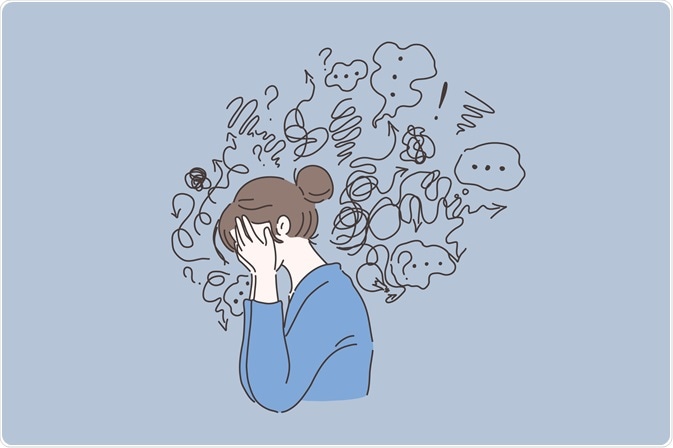Causes of Phobias
Fear is normal for all individuals. Phobias are specific anxiety disorders when the fear for an object, animal, bird, insect, situation or event is extreme and affect normal living.
 Image Credit: Vectorium / Shutterstock.com
Image Credit: Vectorium / Shutterstock.com
The sufferer usually avoids the feared object or situation at all costs. When confronted with it they may face severe anxiety and panic reactions.
The exact cause of phobias is largely unknown. Phobias usually develop during childhood, adolescence or early adulthood. This may commonly follow a frightening event or a stressful situation. What exactly triggers the phobic reaction that persists for years is as yet unclear.
Causes of simple phobias
Simple phobias usually develop in early childhood. The classic symptoms may begin between the ages of four and eight. An unpleasant episode like a visit to the doctor for shots or to the dentists for a painful tooth extraction often grows in the child’s mind to give rise to a phobia.
Children who have for example been trapped in a closed, dark and confined space by accident or as punishment may develop a fear of enclosed spaces (claustrophobia) when they are older.
Simple phobias are also acquired from members of the family by children. For example, children with a family member who is scared of cockroaches or spiders may “learn” their phobia. These phobias are said to run in families. However, they are not genetically transmitted from parents to their offspring.
Age is thus an important factor in phobia assessment. In children, phobias revolve around loud noises, dark, monsters, painful stimuli like blood, needles, etc.
In prehistoric times risk of injuries from animals, dark, deep waters and being trapped into small spaces was something that most children were conditioned to be scared of. This was the preservation of self and deeply ingrained in the brain.
The brain appears to be ready to develop some types of fears more than others. These are called “prepared fears”. These are usually protective and include dangerous animals like snakes, etc.
Those situations that were dangerous to primitive humans like heights, deep waters, injuries and wild animals still trigger phobias more easily than situations that are more benign such as household objects, etc.
Causes of complex phobias
The cause of complex phobias is as yet unclear. They are said to be brought about by complex interactions between an unpleasant experience, chemistry and chemical messengers of the brain and genetics.
Social phobias, for example, occur after an earlier humiliating experience in public that undermines the person’s social confidence and as an alternative, this confidence fails to develop after childhood.
Both agoraphobia and social phobias tend to begin in the teenage years to late twenties. They may last for years or a lifetime and may be severely debilitating.
Phobias may also be brought about by an unrelated unpleasant event in life. Sometimes the fear may develop after a stressful event or bereavement.
Phobias are also more common in persons who have high general levels of anxiety. Phobias can also result from witnessing the trauma of someone else. This type of learning a fear is called “conditioning”. Conditioning may also occur by seeing trauma occur to others in real life or in movies, etc.
References
- http://www.nhs.uk/Conditions/Phobias/Pages/Causes.aspx
- http://www.healthwise.org.hk/az/english/pdf/E%2027.pdf
- http://www.drbeckham.com/handouts/CHAP12_COPING_WITH_PHOBIAS.pdf
- http://www.uncommon-knowledge.co.uk/psychology_articles/phobias.pdf
- http://www.adaa.org/sites/default/files/phobias_adaa.pdf
- http://www.camden.nhs.uk/downloads/Panic%20and%20phobias.pdf
Further Reading
- All Phobia Content
- What is a Phobia?
- Types of Phobias
- Diagnosis of Phobias
- Treatment of Phobias
Last Updated: Jan 19, 2021

Written by
Dr. Ananya Mandal
Dr. Ananya Mandal is a doctor by profession, lecturer by vocation and a medical writer by passion. She specialized in Clinical Pharmacology after her bachelor's (MBBS). For her, health communication is not just writing complicated reviews for professionals but making medical knowledge understandable and available to the general public as well.
Source: Read Full Article